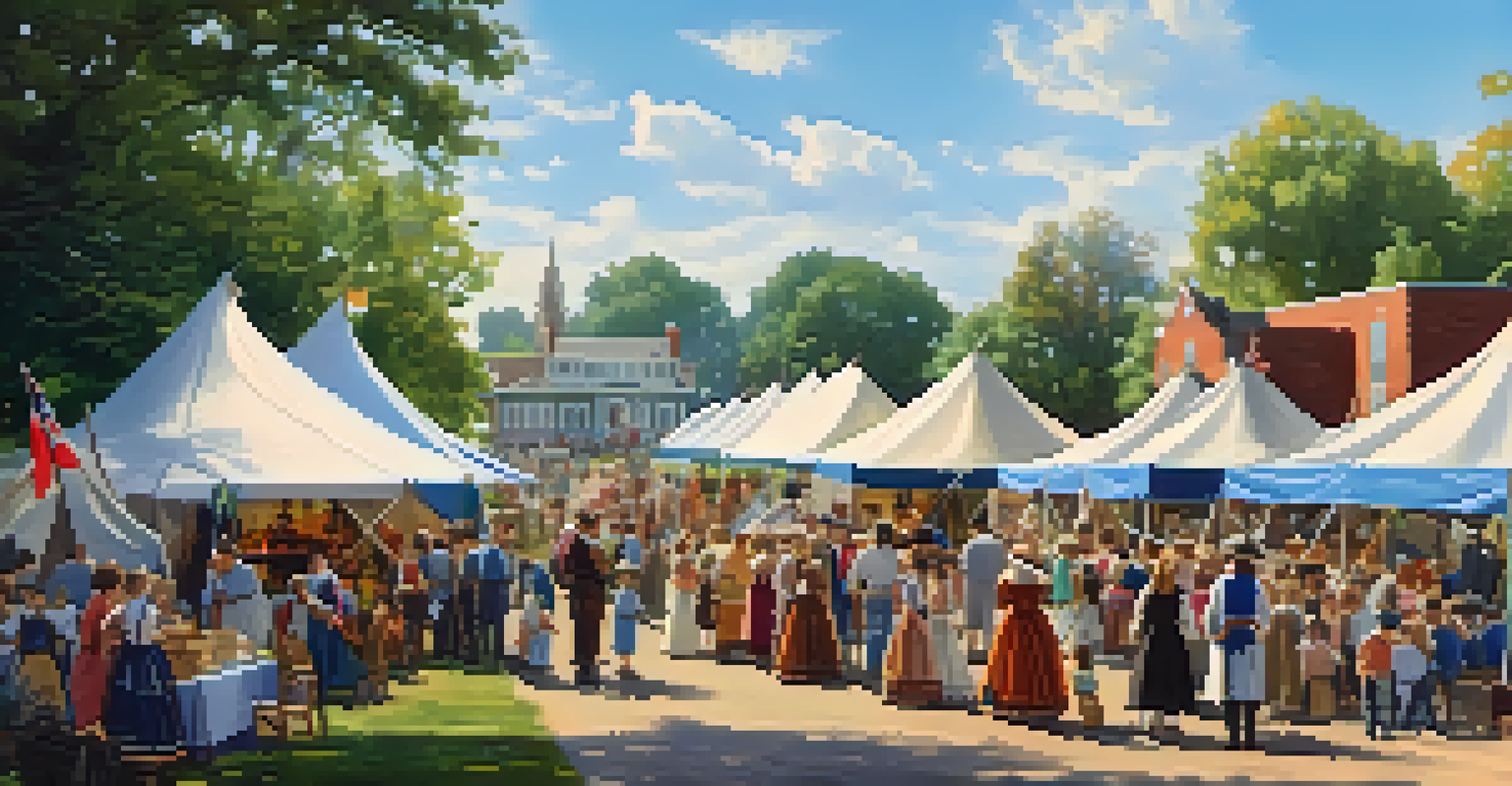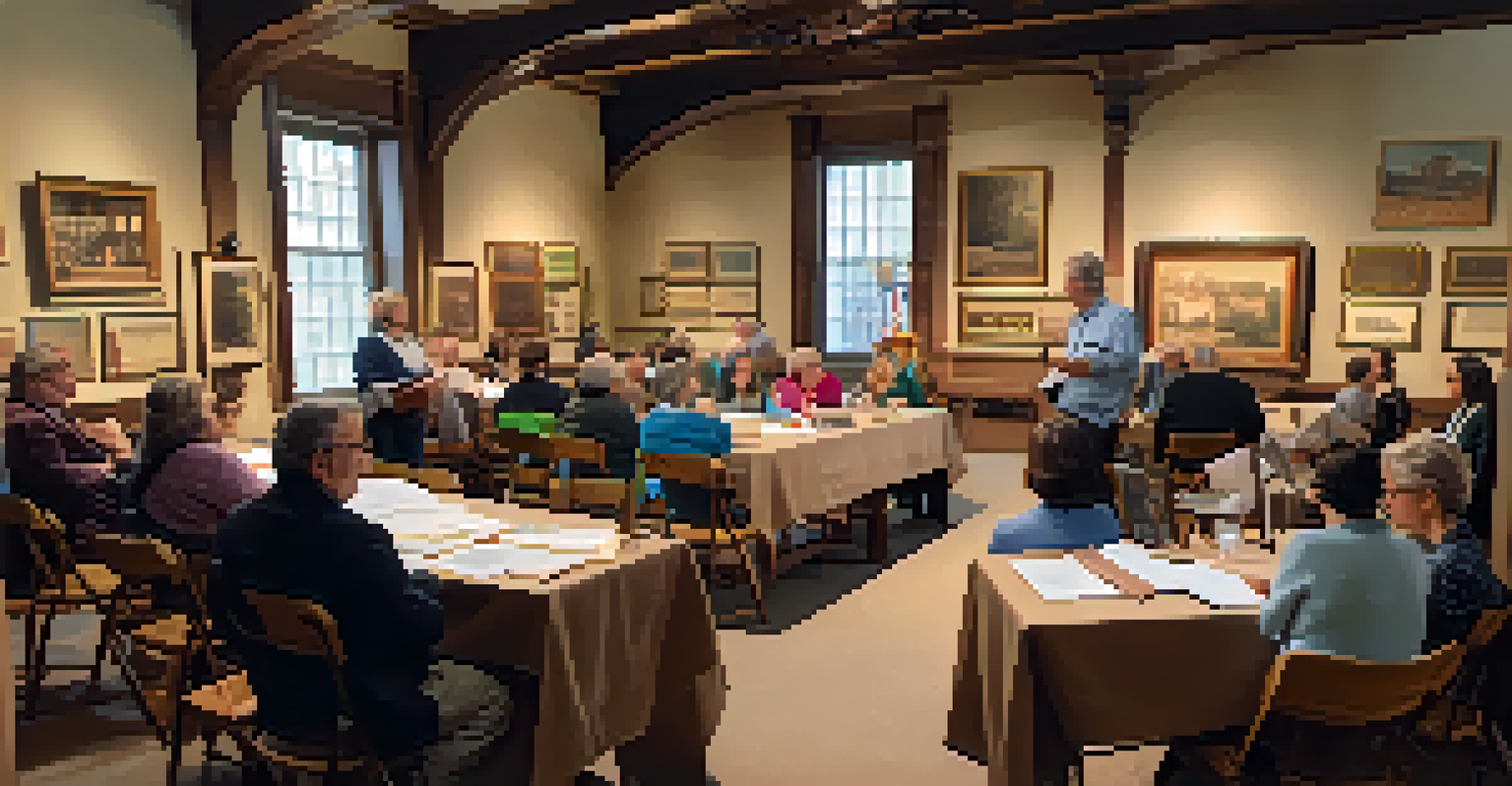A Deep Dive into Illinois Historical Societies' Mission

Understanding the Role of Historical Societies
Historical societies serve as guardians of the past, preserving artifacts and stories that define a community's identity. In Illinois, these organizations play a critical role in maintaining the rich tapestry of local history. They not only store historical documents and artifacts but also engage with the public to raise awareness about the significance of history.
History is not a mere record of past events, but a living narrative that shapes our identity and community.
By hosting events, workshops, and educational programs, historical societies create a bridge between the past and present. This engagement fosters a deeper appreciation for local heritage, encouraging residents to take pride in their roots. Thus, the role of these societies extends beyond mere preservation; they actively cultivate a sense of belonging among community members.
Moreover, these societies often collaborate with schools and universities to promote historical education. By integrating local history into the curriculum, they inspire future generations to value and explore their heritage. This commitment to education is a fundamental aspect of their mission, ensuring that history remains relevant and accessible.
Preservation Efforts: A Core Mission
At the heart of every historical society in Illinois lies a commitment to preservation. This mission involves meticulously cataloging and safeguarding documents, photographs, and artifacts that tell the story of the state. Through careful preservation techniques and climate-controlled storage, these societies ensure that valuable pieces of history are not lost to time.

For instance, many societies conduct digitization projects, allowing broader access to historical materials. This effort not only protects fragile items but also makes them available to researchers and history enthusiasts worldwide. By employing technology, they enhance the reach and impact of their collections.
Preserving Local Heritage
Historical societies in Illinois play a crucial role in preserving and safeguarding community artifacts and stories.
Furthermore, preservation efforts often extend to tangible historical sites, such as buildings and landmarks. Historical societies frequently advocate for the protection of these sites, recognizing their importance in telling the broader narrative of Illinois. By preserving both artifacts and locations, they create a comprehensive picture of the state's history.
Community Engagement: Making History Relevant
One of the most vital aspects of Illinois historical societies is their dedication to community engagement. They understand that history is not just about the past; it’s about how that past informs our present and future. By involving the community in historical discussions, they foster a deeper connection with local heritage.
Preservation is the foundation of our future; we cannot know where we are going until we understand where we have been.
These societies often host open houses, lectures, and interactive exhibits, making history accessible and enjoyable. For example, a living history event might bring historical figures to life, allowing attendees to engage with the past in a dynamic way. Such activities spark curiosity and encourage participants to explore their roots further.
Moreover, many societies also focus on inclusivity, ensuring that diverse voices are represented in the historical narrative. By highlighting underrepresented stories and perspectives, they create a more comprehensive understanding of Illinois history. This commitment to inclusivity enriches community ties and promotes a shared sense of identity.
Educational Programs: Inspiring Future Generations
Educational initiatives are central to the mission of Illinois historical societies. These programs aim to inspire curiosity about history among students and the general public. By offering workshops, lectures, and interactive activities, they make learning about history engaging and relevant.
For instance, some societies partner with local schools to create hands-on history projects. These projects might involve students researching local historical figures or events, thus fostering a deeper understanding of their community's past. Such initiatives not only enhance students' research skills but also instill a sense of pride in their heritage.
Engaging the Community
These organizations foster community involvement through events, educational programs, and inclusive narratives that connect the past to the present.
Additionally, historical societies often provide resources for educators looking to incorporate local history into their curricula. By offering lesson plans, artifacts, and expert speakers, they empower teachers to bring history to life in the classroom. This collaboration between educators and historical societies cultivates a love for history in young learners.
Advocacy and Support: Protecting Local History
Historical societies in Illinois are not just about preservation; they also play a crucial role in advocacy. They work tirelessly to protect local history and heritage, often lobbying for funding and support from government entities. This advocacy ensures that historical preservation remains a priority within communities.
In addition to lobbying efforts, many societies provide guidance on best practices for preservation. They offer workshops and resources to help local organizations and individuals understand the importance of safeguarding their historical assets. This support creates a network of informed advocates dedicated to protecting history.
Moreover, historical societies often collaborate with national organizations, amplifying their impact. By joining forces with larger entities, they can access additional resources and support for their initiatives. This collaborative approach strengthens the overall mission of preserving and promoting Illinois history.
Challenges Facing Illinois Historical Societies
Like many organizations, Illinois historical societies face several challenges in fulfilling their mission. One significant issue is funding, as many rely on grants and donations to operate. With fluctuating budgets, maintaining programs and preserving artifacts can become a daunting task.
Additionally, the digital age presents both opportunities and challenges. While technology can enhance preservation efforts, it also requires society members to adapt to new tools and methods. Keeping up with technological advancements demands time and resources, which can be limited for smaller organizations.
Advocacy for Historical Preservation
Illinois historical societies advocate for funding and support, ensuring the prioritization of local history preservation efforts.
Finally, engaging younger generations poses another challenge. As interests shift, historical societies must find innovative ways to capture the attention of a tech-savvy audience. By embracing new platforms and creative storytelling methods, they can continue to make history relevant and exciting for all ages.
The Future of Illinois Historical Societies
Looking ahead, the future of Illinois historical societies appears promising, though not without its challenges. By adapting to the digital landscape and embracing innovative approaches, they can continue to engage the community effectively. This adaptability is crucial for ensuring that history remains a vibrant part of everyday life.
Collaboration will also be key in the coming years. By partnering with other organizations, schools, and community groups, historical societies can pool resources and expand their reach. These partnerships can lead to exciting new programs and initiatives that make history more accessible to everyone.

Ultimately, the mission of Illinois historical societies will continue to evolve, reflecting the changing needs and interests of the community. As they navigate this dynamic landscape, their commitment to preserving and promoting local history remains steadfast, ensuring that the rich stories of Illinois continue to be told for generations to come.